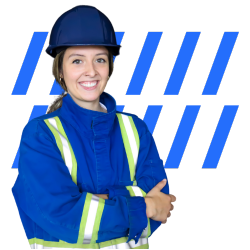Hard-To-Reach Areas Inspections
In this blog post, we’ll explore the challenges associated with inspecting hard-to-reach areas and the specialized non-destructive testing (NDT) solutions required for these environments. Additionally, we will share a success story that showcases how Nucleom used drones to assess the integrity of an underground pit for a client. By collaborating with Nucleom, clients can benefit from the expertise of certified drone pilots and partners (rope access companies) to ensure regular inspections and maintenance of assets in hard-to-reach areas.
Introduction
Many clients’ inspection needs are in hard-to-reach areas, such as at-height, confined spaces, and subsea locations, and conventional NDT methods may not always be suitable. Therefore, specialized NDT solutions and trained experts are necessary to perform inspections in these challenging environments.
Some examples of hard-to-reach locations include bridges, underwater and underground assets, water tanks, structures in height, and many more. Inspecting these areas can be complex and potentially dangerous, which makes it essential to have a deep understanding of the equipment, techniques, and safety protocols necessary to conduct these inspections effectively.
How to inspect hard-to-reach areas?
Choosing the appropriate method for inspecting hard-to-reach areas depends on various factors such as location, accessibility, and required accuracy of inspection data. Nucleom uses drones to offer a remote inspection solution that allows inspectors to collect data without physically accessing hard-to-reach locations. This method is becoming increasingly popular due to its efficiency, accuracy, and cost-effectiveness. Scaffolding and rope access are other methods that could be used to inspect hard-to-reach areas, however they require additional safety measures and training preparation.
Success Story: Inspection of a pit for corrosion, structure integrity, and further development.
Our client had a sprawling underground pit measuring 20 meters wide by 30 meters long and 40 meters deep adjacent to its building. With an upcoming development project requiring the installation of infrastructures (staircases and more) alongside the building, integrity assessment of the space was important. However, conventional methods such as cranes and scaffolding proved impractical, if not impossible, to achieve accurate and comprehensive results. Nucleom’s team proposed an alternative solution – the use of a drone, to provide a detailed overview of the empty space, including the assessment of the build’s integrity, the ceiling, the bedrock foundation, and the retention walls. The drone’s ability to navigate the underground area allowed us to go into the pit and closely inspect the region of interest. Undertaking a drone inspection in such an environment was not without its hurdles. The drone unfriendliness of the environment: protruding objects, outdoor openings, and the sheer size of the underground area posed some challenges to flying.
Despite these circumstances, the drone successfully flew into the pit, inspecting the beams, hatch, and foundation conditions. During the inspection, general corrosion was discovered at the hatch opening, which could potentially allow water ingress. This information enabled our client to make informed decisions to preserve the structural integrity of its building.
Partnering with Nucleom
At Nucleom, our team consists of certified drone pilots, and we collaborate closely with rope access companies and trained divers to offer comprehensive services to our clients. Our aim is to ensure that assets located in hard-to-reach areas receive regular inspections as they need.
 If you’re interested in learning more about our hard-to-reach solutions or would like to discuss your inspection needs, contact our sales team. We are always available to help and look forward to hearing from you.
If you’re interested in learning more about our hard-to-reach solutions or would like to discuss your inspection needs, contact our sales team. We are always available to help and look forward to hearing from you.
For more information on Nucleom’s DRONES SOLUTIONS
About us
Nucleom, a Canadian NDE company founded in the province of Quebec, has been extensively involved in non-destructive examination services in Canada and internationally since 2010. A combination of site experience and NDE tool design know-how gives Nucleom an in-depth perspective of on-site challenges for the NDE system operation. Nucleom’s expertise extends into areas of NDE tool development, tool integration and site inspection campaign execution. Nucleom now has offices in Quebec (Quebec City/Montreal), Ontario (Whitby/Kincardine) and Alberta (Edmonton).
